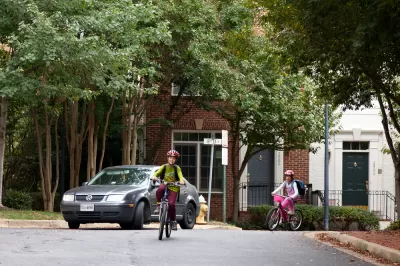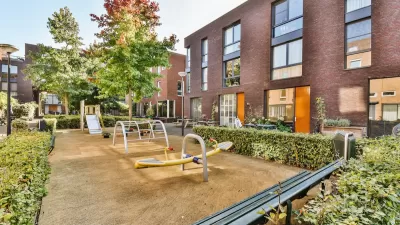Without children at the center of activity, the urban neighborhoods of today offer little compared to the ideals expressed by Jane Jacobs, according to this strongly worded critique of contemporary urbanism.

Benjamin Schwarz begins a critique of what he calls the Vibrant Urban Neighborhood with the following description of his subject: "its standard-issue bike shops and vintage clothiers, its 'authentic' live-work spaces and dive bars, its predictable purveyors of vinyl records and locally-sourced foodstuffs, its de rigueur venues for generically hip 'live music,' its uniform throngs of overwhelmingly unmarried and childless active or aspiring knowledge workers ritualistically intoning the shibboleth of 'diversity'…"
Instead of the renaissance many urbanists describe, the increasing popularity of Vibrant Urban Neighborhoods, or VUNs, "merely demonstrates that consumption and entertainment have become the dominant means of self-definition and of what passes for political expression—and, concomitantly, it signifies not the triumph of urban life but of our crabbed vision of the promise and potentialities of neighborhood and community."
To further describe where the urban renaissance has gone wrong, Schwartz compares contemporary urban neighborhoods to those extolled by Jane Jacobs. According to Schwartz, children are the component most lacking from contemporary neighborhoods. In fact, the bulk of the argument contained in the column is devoted to reframing the importance of children in some of Jacobs's most famous passages, and achieving an accurate comparison of the "urban villages" of her day with the VUNs of ours.
By discussing children, Schwartz also enters into an ongoing debate about the long-term appeal of urban environments to families as they age and grow. Planetizen blogger Michael Lewyn recently wrote about the complex demographic trends unfolding for families in and around cities. Other recent stories have lamented the lack of priority given to children in setting an urban agenda in Oakland, California, and provided statistical analysis of the U.S. cities with the most children.
FULL STORY: Cities Without Children

Alabama: Trump Terminates Settlements for Black Communities Harmed By Raw Sewage
Trump deemed the landmark civil rights agreement “illegal DEI and environmental justice policy.”

Study: Maui’s Plan to Convert Vacation Rentals to Long-Term Housing Could Cause Nearly $1 Billion Economic Loss
The plan would reduce visitor accommodation by 25% resulting in 1,900 jobs lost.

Planetizen Federal Action Tracker
A weekly monitor of how Trump’s orders and actions are impacting planners and planning in America.

Wind Energy on the Rise Despite Federal Policy Reversal
The Trump administration is revoking federal support for renewable energy, but demand for new projects continues unabated.

Passengers Flock to Caltrain After Electrification
The new electric trains are running faster and more reliably, leading to strong ridership growth on the Bay Area rail system.

Texas Churches Rally Behind ‘Yes in God’s Back Yard’ Legislation
Religious leaders want the state to reduce zoning regulations to streamline leasing church-owned land to housing developers.
Urban Design for Planners 1: Software Tools
This six-course series explores essential urban design concepts using open source software and equips planners with the tools they need to participate fully in the urban design process.
Planning for Universal Design
Learn the tools for implementing Universal Design in planning regulations.
Caltrans
Smith Gee Studio
Institute for Housing and Urban Development Studies (IHS)
City of Grandview
Harvard GSD Executive Education
Toledo-Lucas County Plan Commissions
Salt Lake City
NYU Wagner Graduate School of Public Service





























